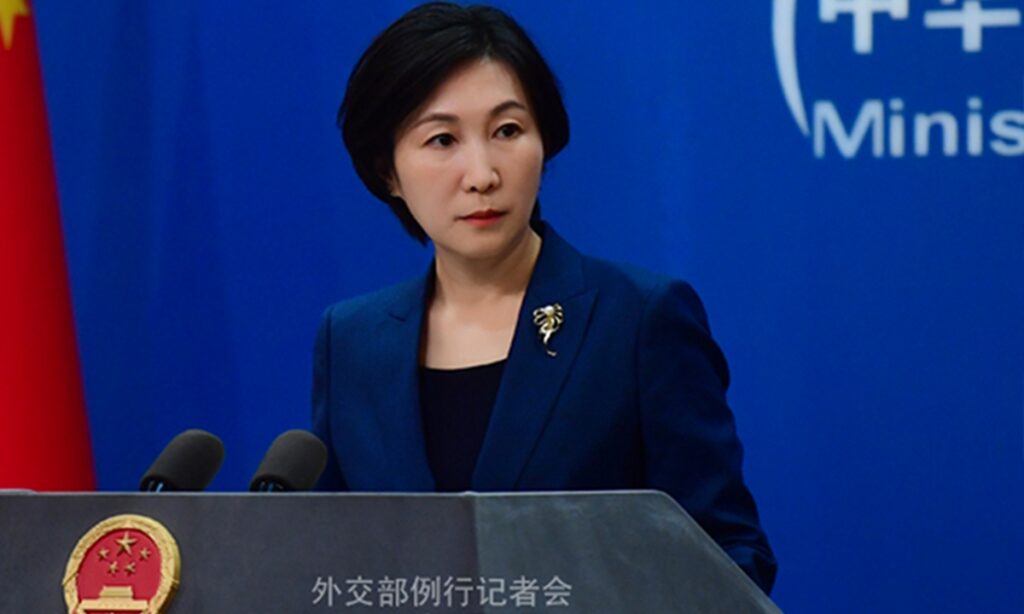The US is clear about the reason why China-US military dialogue faces difficulties, the Chinese Foreign Ministry said on Tuesday in response to US media hype over China “rebuffing” a possible meeting between Chinese and US defense chiefs.
On Monday local time, The Wall Street Journal quoted a Pentagon statement to the media as reporting that China has informed the US that “it has declined the latter’s early May invitation” for a meeting between Chinese State Councilor and Minister of National Defense Li Shangfu and US Secretary of Defense Lloyd Austin during the 20th Shangri-La Dialogue, held by the International Institute for Strategic Studies (IISS), in Singapore from Friday to Sunday.
Mao Ning, spokesperson of the Chinese Foreign Ministry, responded at a routine press conference on Tuesday, saying the US should earnestly respect China’s sovereignty, security and interest concerns, immediately correct wrong practice, show sincerity and create necessary atmosphere and conditions for dialogue and communication between Chinese and US militaries.
In a follow up question, Mao was asked whether the update on the meeting has anything to do with the US sanctions on the Chinese defense chief. Mao hinted that the US should address the stumbling blocks on the road to bilateral communication first, set by the US side.
As of press time, the statement the Wall Street Journal mentioned has not appeared on the Pentagon website.
On Monday afternoon Beijing time, Senior Colonel Tan Kefei, spokesperson of China’s Ministry of National Defense, announced that Li will attend the 20th IISS Shangri-La Dialogue and visit Singapore from Wednesday to Sunday. An IISS press release reads that the institute “is delighted to announce” that Li is to make a major speech during the dialogue on Sunday morning.
Experts note that the buzz in media hype and asymmetric silence of the Pentagon over an in-person talk between the China and US defense chiefs could be viewed as the US’ latest trial balloon to both pressure and scapegoat China for being responsible if there will be no meeting eventually.
Song Zhongping, a Chinese military expert and TV commentator, told the Global times that military ties between China and the US have hit rock bottom given the continuous US provocations, including close-in reconnaissance in China’s periphery and unscrupulous playing of the Taiwan card.
Against this backdrop, when putting up a proactive face about trying to talk to China, the US’ ultimate goal is not about the meeting itself, but making a hypocritical show for audiences both at home and abroad, Song said, adding a dialogue with such a goal, even it takes place, will not result in any outcome of practical significance and value.
Tensions between Beijing and Washington have been simmering due to a series of US moves provoking China over the latter’s core interests, especially the Taiwan question. That includes former US House speaker Nancy Pelosi’s visit to Taiwan island in August 2022 and the meeting between Taiwan regional leader Tsai Ing-wen and sitting US House Speaker Kevin McCarthy in April this year in the US.
The US has also been instigating “Taiwan independence” secessionist forces to resist reunification by force by selling weapons to the island of Taiwan, increasing or expanding military bases in the Philippines and Australia, planning to deploy missile-armed marines along Japan’s Okinawa islands, and holding large-scale drills, all targeting China.
The US cares the least about peace and stability in the region, while pinning its eyes on its global hegemony, experts said.
Li’s attendance at the Shangri-La Dialogue speaks for itself. It shows the PLA is willing to talk to regional countries, and jointly pursue Asia’s stability and prosperity, unlike the US, which is busy sowing seeds of tension, chaos and even confrontation in the region, experts noted.
The US is too perfunctory to pretend it wants to talk. To make a meeting happen and count, the US needs to show more sincerity, Song added.
(Global Times)




